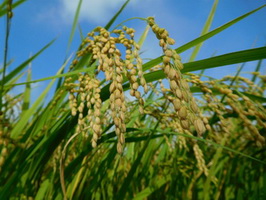
Scientists Discover Way to Make Rice Plants Replicate through Seeds as Clones
December 19, 2018| |
 Researchers at the University of California, Davis (UC Davis), have discovered a way to make rice plants replicate through seeds as clones. Though 400 species of wild plants produce viable seeds without fertilization, the same process has not evolved in most commercial crop species. The work led by postdoctoral researcher Imtiyaz Khanday and Venkatesan Sundaresan, professor of plant biology and plant sciences at UC Davis, is a major step forward.
Researchers at the University of California, Davis (UC Davis), have discovered a way to make rice plants replicate through seeds as clones. Though 400 species of wild plants produce viable seeds without fertilization, the same process has not evolved in most commercial crop species. The work led by postdoctoral researcher Imtiyaz Khanday and Venkatesan Sundaresan, professor of plant biology and plant sciences at UC Davis, is a major step forward.
The researchers discovered that the rice gene BBM1, belonging to a family of plant genes called "Baby Boom" (BBM), is expressed in sperm cells but not in eggs. After fertilization, BBM1 is expressed in the fertilized cell, but — at least initially — this expression comes from the male contribution to the genome. BBM1 switches on the ability of a fertilized egg to form an embryo.
Using gene editing, the researchers were able to prevent the plants from going through meiosis and form egg cells by mitosis, inheriting a full set of chromosomes from the mother. Then they caused these egg cells to express BBM1, which they would not normally do without fertilization. "So we have a diploid egg cell with the ability to make an embryo, and that grows into a clonal seed," Sundaresan said.
According to Sundaresan, the process has an efficiency of about 30 percent, but they hope it can be increased with more research. The approach should work in other cereal crops, which have equivalent BBM1 genes, and in other crop plants as well, Sundaresan said.
For more details, read the news release from UC Davis.
| |
Biotech Updates is a weekly newsletter of ISAAA, a not-for-profit organization. It is distributed for free to over 22,000 subscribers worldwide to inform them about the key developments in biosciences, especially in biotechnology. Your support will help us in our mission to feed the world with knowledge. You can help by donating as little as $10.
-
See more articles:
-
News from Around the World
- Multidisciplinary Study Traces Movement of Maize in South America
- Rwandan Women in Biosciences Embrace Science Communication
- Iowa State University Study Says Anti-GMO Sentiment Has Repercussions for Developing World
- Scientists Discover Way to Make Rice Plants Replicate through Seeds as Clones
- Australian OGTR Receives License Application for Field Trial of GM Chickpea
- Japan May Allow Genome-edited Food Sale
- Plants Don't Like to be Touched, Study Finds
- Stockholm University Scientists Discover Gene that Helps Submerged Plants
-
Research Highlights
- Research Reveals MON 810 and NK603 GM Maize Have No Effects on Rat Health or Metabolism
- Study Shows Inheritance of Transgenes in Bt Cotton Lines Resistant to Bollworm
-
Beyond Crop Biotech
- GM Pigs Resist Infection from Classical Swine Fever Virus
-
Resources
- Revised ISAAA Infographics: 22 Years of Biotech Crops in the World
- Talking Biotech: How Do We Get Consumers to Think Like Scientists?
-
Plant
- Europe Grants CRISPR-Cas9 Patent to Calyxt
- CRISPR-Cas9 Used in Breeding Indica Glutinous CMS Line WX209A
-
Read the latest: - Biotech Updates (December 17, 2025)
- Gene Editing Supplement (December 17, 2025)
- Gene Drive Supplement (February 22, 2023)
-
Subscribe to BU: - Share
- Tweet
